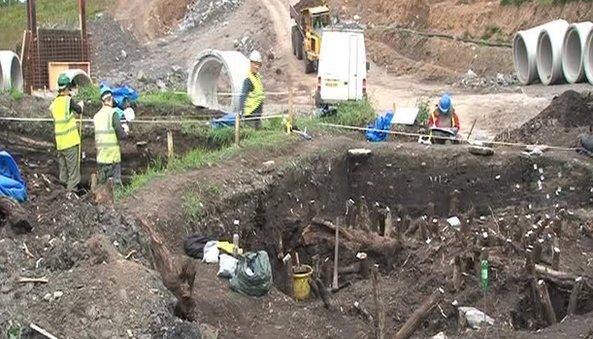'No-go zone' imposed around Enniskillen crannog
- Published

The unexpected discovery is in the path of a new road in County Fermanagh
The environment minister has imposed a "no-go zone" around an archaeological site on the route of a new road in County Fermanagh.
Ancient human remains and pottery were unearthed at the site in Enniskillen.
Archaeologists are currently excavating the crannog - a kind of artificial island - and have said that it could date back more than 1,000 years.
The minister, Alex Attwood, has banned construction traffic from passing close to the crannog during excavation work.
The new road will eventually be built on top of the crannog, and the <link> <caption>Institute for Archaeologists</caption> <url href="http://www.archaeologists.net/news/120725-crannog-site-drumclay-co-fermanagh" platform="highweb"/> </link> (IfA) has raised concerns about "the apparently imminent destruction" of the historical site.
The crannog was regarded as too fragile to preserve rather than excavate after nearby engineering works for the road scheme drained water from the site.
'Precious'
A period of seven weeks was allocated for archaeologists to examine and record the crannog before the construction went ahead. The IfA said this was inadequate.
Mr Attwood visited the area on Monday and described it as "a wonderful site, full of our history and precious archaeology".
He said: "I have requested a report by Wednesday on what further time, staff and resources are needed to fully excavate the crannog.
"As one of the very few to be excavated, I wish to deploy appropriate resources to fully excavate and record this gem of archaeology".
The Roads Service said it was not aware of the existence of the crannog before construction work began.
A spokesman told the BBC they would have attempted to build around, rather than through the site, had they known in advance. They are picking up the bill for the excavation.
Campaigners say the existence of the crannog has been long known and listed in planning documents for some years.
Mr Attwood said he would "appoint an independent person or persons to review the full story of this site, including how the current situation developed".
He added: "If the crannog cannot now be saved, I will work to have a maximum excavation and record strategy going forward."
'Bronze Age'
The crannog was originally thought to be 700 years old, but fragments of pottery found at the site date from as far back as the ninth century.
Other finds include arrowheads dating from the Bronze Age, a leather shoe which was preserved in the earth and a fine-toothed comb made from bone.
- Published26 July 2012